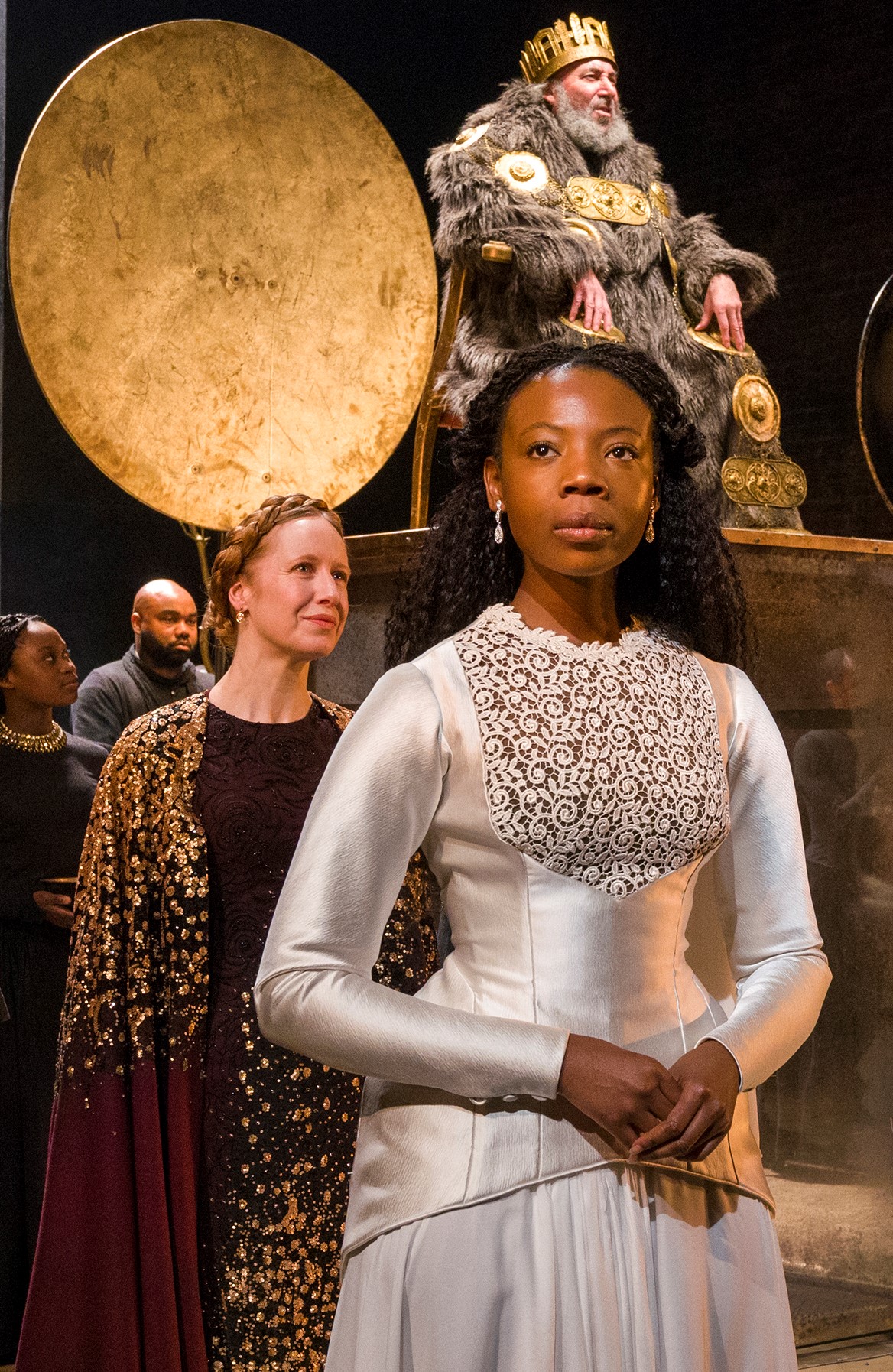In 1940 British critic James Agate said of John Gielgud’s King Lear: “I do not feel that this Lear’s rages go beyond extreme petulance—they do not frighten me!” No such reservation afflicts Gregory Doran’s intelligent and well-spoken Royal Shakespeare Company production, which stars Antony Sher as the king—the Shakespearean role that Sher, who last year played Falstaff at BAM, says will be his last.
Oliver Johnstone (left) is Edgar, and David Troughton plays his blinded father, the Earl of Gloucester, in King Lear. Top: Antony Sher as Lear rails against his oldest daughter, Goneril (Nia Gwynne), as Kent (Antony Byrne, left) looks on.
Sher’s Lear is clearly spoken, emotionally powerful and authoritative. Dressed in a shaggy fur coat adorned with brass decorations and a Cossack’s hat, this Lear first appears atop a large box with sides of glass or plastic. (It’s designer Niki Turner’s only break with the setting in pagan Britain, and a bit jarring.)
When he says that he’s dividing the kingdom “that future strife may be prevented now,” he pauses before the last word and stresses it. He’s less majestic than a practical businessperson, but when he rages, he's a force of nature, splenetic in banishing his daughter Cordelia and his servant Kent.
This Iron Age ruler is to be feared. When he orders the neglectful Oswald (Byron Mondahl) to approach him with “Oh, you, sir, you. Come you hither,” he weaponizes every you. Very quickly he learns he is no longer the monarch, however, and then comes a thunderous—and frightening—curse on Goneril, his eldest:
Hear, Nature, hear, dear goddess, hear!
Suspend thy purpose if thou didst intend
To make this creature fruitful.
Into her womb convey sterility.
Dry up in her the organs of increase….
The bulky costume is gradually shed as Lear loses power and sanity, until he is left only in a white shift. During the storm on the heath, when he asks the gods not to let him go mad, he says, “My wits begin to turn,” and one wonders if “madness” may simply be Shakespeare’s term for Alzheimer’s.
Goneril and Lear with Mimi Ndiweni as Cordelia (center). Photographs by Richard Termine.
Humanizing the characters also comes out in Doran’s treatment of Goneril and Regan. Less like the wicked stepsisters in a fairy tale, they seem to be perennial targets of paternal oppression. When Goneril says of Cordelia (a proud and chilly Mimi Ndiweni), “he always loved our sister most,” one senses a long-held grudge. And when Lear asks his daughters to step forward to hear the division of the kingdom, the facial expression on Nia Gwynne’s Goneril conveys that this sort of thing is old hat—another tired test to please their father. Indeed, Gwynne is just terrific. Although the text provides a rational objection to Lear’s retinue, Doran goes out of his way to earn sympathy for Goneril: she’s shown distributing food to the poor, and when she complains to Lear about his unruly followers, they mock her with raw misogyny.
Kelly Williams’ Regan is more traditional: throughout she seems mercenary, a better match for James Clyde’s ruthless Cornwall than Goneril is for Clarence Smith’s upright Albany. Regan is quicker to turn against Lear, so that the turning of Goneril is perhaps a shade less persuasive, given the earlier decency she has shown.
Doran has played freely with the text, reorganizing scenes and silently updating language—using “kissing” in lieu of “bussing,” for instance. Extras are employed as vagabonds, so that a line like Edgar’s “This country gives me proof of Bedlam beggars” may resonate with New York subway riders. There are also homeless people in the barn where Lear, the Fool and Edgar take shelter from the storm. (Extras from Brooklyn have helped give the play an epic feel.) There is little, however, he can do to make the Fool less tedious.
Gloucester with his bastard son Edmund (Paapa Essiedu).
The parallel plot of Gloucester (David Troughton) and his two sons, the bastard Edmund (Paapa Essiedu) and the legitimate Edgar (Oliver Johnstone), is equally well handled. Essiedu often plays to the audience, and he finds comedy in unlikely places—when he gives himself a cut that he will claim Edgar inflicted, a few audience members gasped, and he responded, “I’ve seen drunkards do more than this in sport,” then, building on it like a skilled comedian, he winces and doubles over at a level of pain he didn’t expect. Johnstone is an able and heroic Edgar, and the moment that the blind Gloucester feels his face and recognizes the child he wronged is deeply moving. (The putting out of Gloucester’s eyes is done in that glass booth, which proves a smart move—no blood to clean up on stage and plenty of gore on the walls!)
No King Lear production is ever perfect, but Doran’s is a splendid rendering of a great play, and Sher’s Lear is every inch a king that devotees of Shakespeare won’t want to miss.
The Royal Shakespeare Company production of King Lear runs through April 29 at the BAM Harvey Theater. Evening performances are at 7:30 p.m. Tuesday through Saturday; matinees are at 1:30 p.m. Saturday and 3 p.m. Sunday. For tickets and information, visit bam.org.






